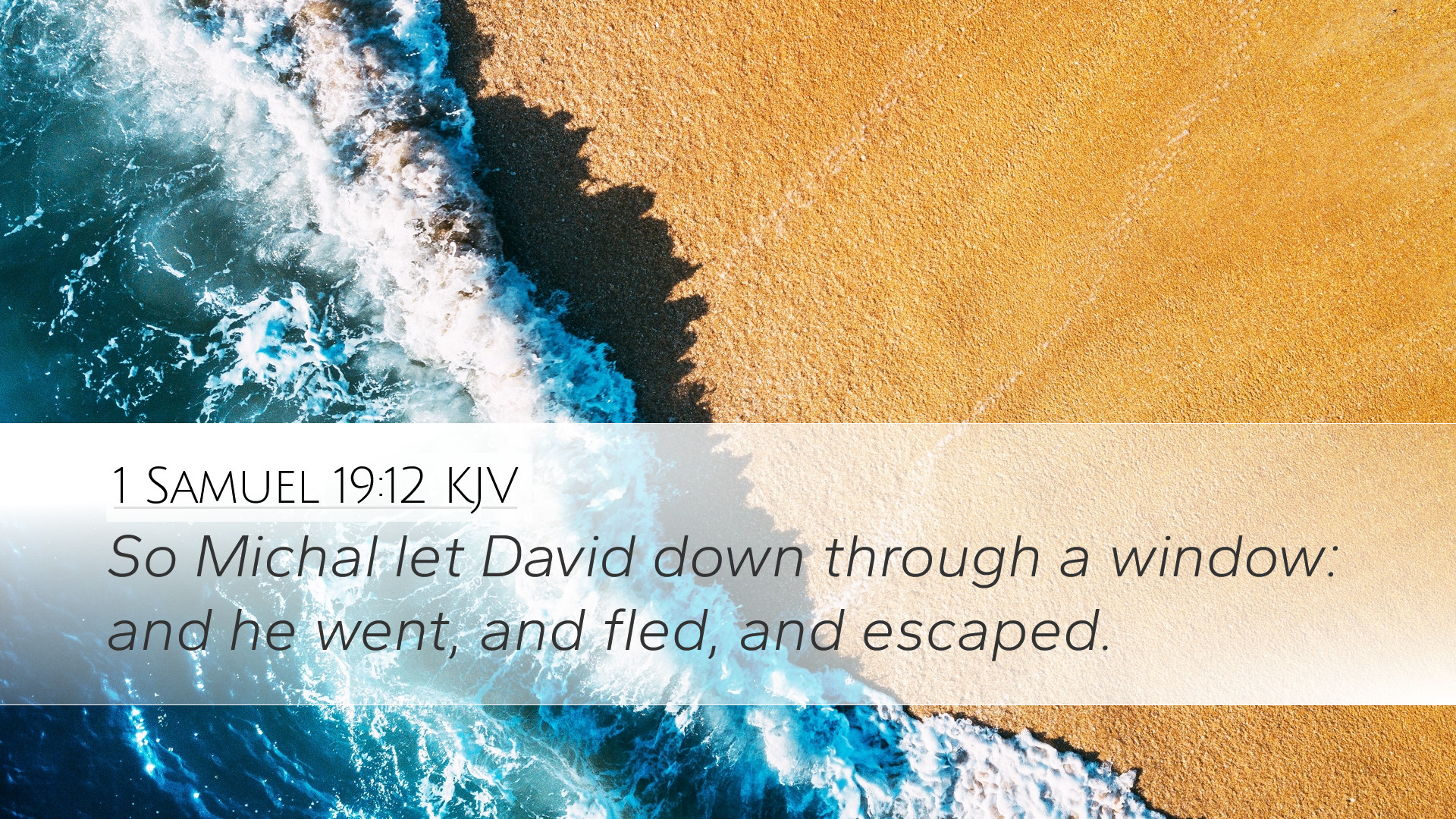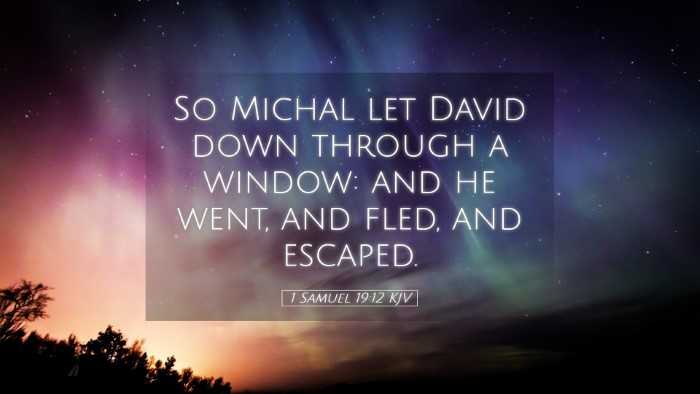Commentary on 1 Samuel 19:12
Verse Reference: 1 Samuel 19:12 - "So Michal let David down through a window: and he went, and fled, and escaped." (KJV)
Contextual Background
The narrative of 1 Samuel 19 captures a pivotal moment in the life of David and reveals the intricacies of his relationship with Saul and Michal, Saul's daughter and David’s wife. Following David's triumph in defeating Goliath, jealousy consumes Saul, leading him to a relentless pursuit of David. The backdrop sets the stage for understanding the gravity of Michal's actions, which are imbued with themes of loyalty, love, and the struggle against oppressive authority.
Exegesis of the Verse
This verse serves as a significant turning point in the narrative; it highlights a moment of peril for David and showcases Michal's bravery as she intervenes to save her husband. The act of letting David down through the window symbolizes both physical escape and a deep relational bond.
- Physical Escape: Michal's act of lowering David reflects the urgency of the situation, showcasing her quick thinking and determination in the face of danger.
- Symbolism of the Window: The window serves as a motif representing transition, opportunity, and the escape from the confines of Saul's oppressive rule.
- Gender Dynamics: Michal's role also reflects the complexity of women's agency in the biblical narrative, as she takes bold action in a patriarchal society.
Thematic Insights
Several key themes arise from this passage, contributing to a deeper theological understanding applicable to both individual and communal contexts.
- Loyalty and Love: Michal's willingness to aid David demonstrates profound loyalty, emphasizing that true love often requires sacrifice and courage.
- Divine Providence: David’s escape can be viewed through the lens of God’s providence, as He intervenes in human affairs to protect His anointed. This reflects God’s overarching plan for David’s future kingship.
- Resistance to Authority: The narrative invites reflection on the nature of authority and the righteous resistance against tyranny, emphasizing that divine appointment is distinct from human political machinations.
Commentary Insights
Matthew Henry's Commentary:
Henry remarks that Michal’s actions were not only sensible but also valiant. She played a critical role by risking her own safety for David, recognizing his innocence and the unjust nature of Saul's fury. The act of letting David escape highlights the compassion and love she felt towards him. Henry emphasizes the importance of acts of faith and loyalty in times of turmoil.
Albert Barnes' Notes:
Barnes underscores that Michal's involvement in David's escape illustrates her commitment and loyalty to God’s chosen. He notes the strategic use of the window as a means of escape and how it reflects the cleverness of Michal in securing David's safety. Barnes further explores the implications of their relationship amidst danger, inviting readers to consider the dimensions of covenant love within marriage.
Adam Clarke’s Commentary:
Clarke emphasizes the perilous environment surrounding David. He elucidates Michal’s status as both daughter of Saul and wife to David, creating complex loyalties. Clarke suggests that her actions represent a defiance against her father's tyrannical rule while affirming her bond to David. He details how her renouncement of her familial allegiance to protect David symbolizes a profound moral and spiritual choice.
Applications for Modern Readers
The rich narrative and themes present in 1 Samuel 19:12 offer valuable lessons for contemporary pastors, students, and scholars. Reflecting upon Michal's bravery can inspire individuals to act with integrity and loyalty in their relationships, emphasizing the importance of standing by those who are oppressed or unjustly treated.
- Encouragement to Act: Modern believers are encouraged to take courageous stands for righteousness, akin to Michal’s actions in aiding David.
- Understanding of Authority: This passage invites a thoughtful examination of the nature of authority, encouraging discernment when it conflicts with divine principles.
- Exploration of Gender Roles: Michal's role raises important conversations about gender dynamics within faith communities, highlighting the potential for women's leadership and agency.


